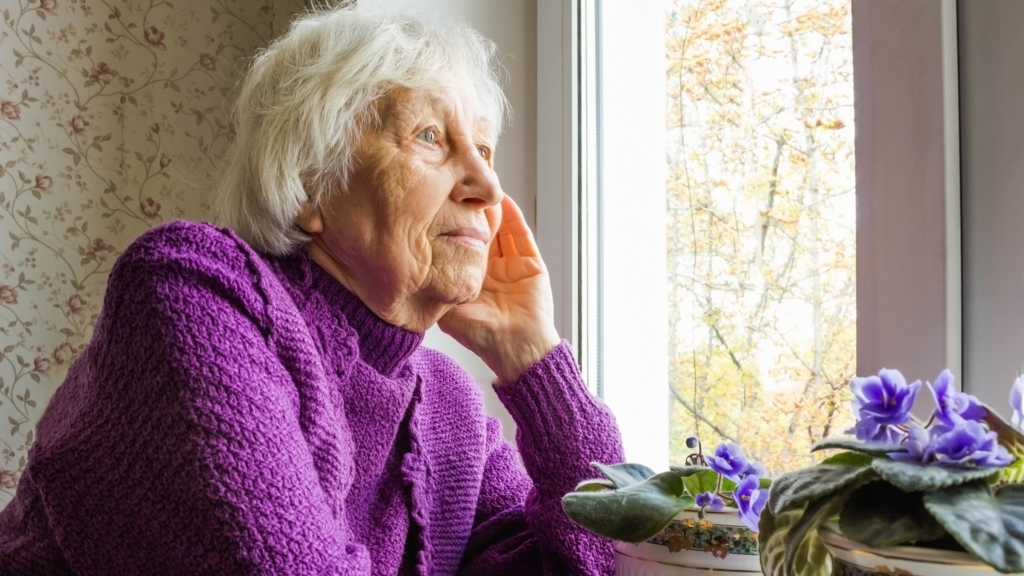Loneliness among seniors, especially in hospice care, is a profound challenge that impacts emotional, mental, and physical well-being. In this blog, we shed light on the importance of addressing the issue of elderly loneliness and how it can be prevented and treated.
Understanding Elderly Loneliness
Senior loneliness encompasses a profound sense of social disconnection and isolation experienced by individuals in their later years. It extends beyond physical solitude, penetrating the emotional and psychological realms, and impacts one’s overall well-being.
Research indicates that senior loneliness is a prevalent concern, with many older adults experiencing varying degrees of isolation. Within hospice settings, this isolation can become more pronounced due to the nature of end-of-life care, where individuals often confront their mortality and may grapple with a sense of abandonment or loss.
Hospice care environments present distinctive challenges that amplify feelings of loneliness among seniors. Patients may grapple with the loss of their established social circles due to illness or distance, leading to a deep sense of separation. Moreover, the emotional weight carried by both patients and their families in these settings can create an environment where addressing loneliness might take a back seat to immediate medical needs.
What Are the Causes and Effects of Elderly Loneliness?

Various factors influence loneliness among seniors in hospice care and have profound effects on their well-being. Understanding the causes and consequences of this isolation is crucial in providing comprehensive care within these settings.
Factors contributing to loneliness in seniors within hospice care include the following:
- Loss of Significant Relationships: The departure or distance from loved ones due to illness or the advanced stage of life can intensify feelings of isolation. Seniors may grapple with the absence of familiar faces and the support that these relationships once provided.
- Role Transitions and Identity Shifts: As individuals transition into hospice care, they may confront a shifting sense of identity and purpose, impacting their social interactions. Coping with changing roles and adjusting to their new circumstances can lead to feelings of detachment.
- Limited Social Opportunities: While essential for end-of-life care, hospice environments might lack structured social activities or platforms for meaningful interactions. The absence of engaging programs can exacerbate feelings of loneliness and isolation.
Loneliness among seniors extends far beyond emotional realms, taking a significant toll on their mental and physical health. Prolonged isolation not only heightens stress, anxiety, and depression but also poses substantial risks to their cardiovascular health, immune system, and cognitive abilities.
Effects of loneliness on senior citizens include the following:
- Psychological Impact: Prolonged loneliness contributes to heightened levels of stress, anxiety, and depression among seniors. The emotional toll of feeling disconnected and unsupported can significantly impact mental well-being.
- Physical Health Consequences: Loneliness doesn’t just affect emotional health; it can also compromise physical health. Seniors experiencing loneliness are at increased risk of cardiovascular issues, weakened immune function, and a decline in cognitive abilities.
How to Recognize the Symptoms of Elderly Loneliness
Early identification and assessment of elderly loneliness are crucial. Understanding the observable signs and behaviors that indicate loneliness in seniors within hospice care is key to addressing their emotional well-being.
Five of the most common observable signs and behaviors indicating loneliness in elderly individuals include the following:
1. Social Withdrawal
Seniors experiencing loneliness may exhibit a withdrawal from social interactions, preferring solitude over engagement with others. They might isolate themselves, avoiding conversations or group activities.
2. Changes in Mood or Affect
Noticeable shifts in mood, such as increased sadness, irritability, or expressions of feeling down, could signal underlying loneliness. These changes might manifest as unexplained mood swings or prolonged periods of low spirits.
3. Lack of Interest in Activities
A decline in interest or enthusiasm for activities previously enjoyed might indicate a loss of motivation linked to feelings of loneliness. Seniors might lose interest in hobbies, social gatherings, or even meals.
4. Physical Manifestations
Loneliness can sometimes manifest physically, leading to disrupted sleep patterns, changes in appetite, or unexplained aches and pains. These physical manifestations can often be linked to emotional distress.
5. Expressing Feelings of Isolation
Verbal cues or expressions of feeling lonely, disconnected, or forgotten are strong indicators of the emotional state of seniors. They might vocalize a sense of abandonment or express a lack of companionship.
How to Prevent and Treat Symptoms of Elderly Loneliness

Implementing proactive solutions and prevention strategies is pivotal in addressing and alleviating senior loneliness within hospice care. Here are effective approaches to support and engage seniors, fostering a sense of belonging and connection:
- Social Engagement Programs: Introducing structured social activities tailored to the interests and capabilities of seniors can create avenues for interaction. Programs include group outings, art and music therapy, book clubs, and more.
- Companionship Initiatives: Pairing seniors with companions or volunteers who regularly visit and engage in meaningful conversations or activities helps combat isolation.
- Technology Integration: Facilitating access to technology enables seniors to stay connected with loved ones through video calls, social media, or virtual communities.
- Support Groups and Counseling: Establishing support groups or offering counseling services allows seniors to express themselves, share experiences, and receive emotional support from peers or professionals.
- Family and Community Involvement: Encouraging involvement from family members and the local community fosters a sense of belonging. Organizing family visitation schedules or community events within the hospice setting promotes inclusivity.
- Person-Centered Care: Recognizing each senior’s unique preferences, backgrounds, and histories ensures personalized care and a sense of value.
How West Michigan Hospice Helps Battle Senior Loneliness
At West Michigan Hospice, we’re committed to addressing elderly loneliness. We’ve implemented specific initiatives and programs tailored to support seniors facing isolation within hospice settings.
Initiatives like structured social engagement programs and personalized companionship initiatives aim to create vibrant and connected environments. Our focus on person-centered care ensures that each senior receives individualized attention and support, fostering a sense of belonging and purpose.
If you or a loved one is seeking a nurturing environment that values companionship and emotional well-being in hospice care, contact West Michigan Hospice today. Let us provide the compassionate support needed during this delicate phase of life. Your journey deserves care that extends beyond medical assistance to encompass emotional fulfillment and connection.

